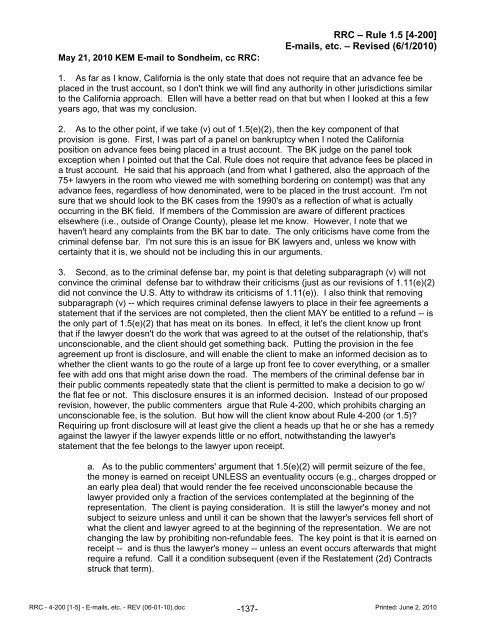Sorted by Commenter - Ethics - State of California
Sorted by Commenter - Ethics - State of California
Sorted by Commenter - Ethics - State of California
You also want an ePaper? Increase the reach of your titles
YUMPU automatically turns print PDFs into web optimized ePapers that Google loves.
May 21, 2010 KEM E-mail to Sondheim, cc RRC:<br />
RRC – Rule 1.5 [4-200]<br />
E-mails, etc. – Revised (6/1/2010)<br />
1. As far as I know, <strong>California</strong> is the only state that does not require that an advance fee be<br />
placed in the trust account, so I don't think we will find any authority in other jurisdictions similar<br />
to the <strong>California</strong> approach. Ellen will have a better read on that but when I looked at this a few<br />
years ago, that was my conclusion.<br />
2. As to the other point, if we take (v) out <strong>of</strong> 1.5(e)(2), then the key component <strong>of</strong> that<br />
provision is gone. First, I was part <strong>of</strong> a panel on bankruptcy when I noted the <strong>California</strong><br />
position on advance fees being placed in a trust account. The BK judge on the panel took<br />
exception when I pointed out that the Cal. Rule does not require that advance fees be placed in<br />
a trust account. He said that his approach (and from what I gathered, also the approach <strong>of</strong> the<br />
75+ lawyers in the room who viewed me with something bordering on contempt) was that any<br />
advance fees, regardless <strong>of</strong> how denominated, were to be placed in the trust account. I'm not<br />
sure that we should look to the BK cases from the 1990's as a reflection <strong>of</strong> what is actually<br />
occurring in the BK field. If members <strong>of</strong> the Commission are aware <strong>of</strong> different practices<br />
elsewhere (i.e., outside <strong>of</strong> Orange County), please let me know. However, I note that we<br />
haven't heard any complaints from the BK bar to date. The only criticisms have come from the<br />
criminal defense bar. I'm not sure this is an issue for BK lawyers and, unless we know with<br />
certainty that it is, we should not be including this in our arguments.<br />
3. Second, as to the criminal defense bar, my point is that deleting subparagraph (v) will not<br />
convince the criminal defense bar to withdraw their criticisms (just as our revisions <strong>of</strong> 1.11(e)(2)<br />
did not convince the U.S. Atty to withdraw its criticisms <strong>of</strong> 1.11(e)). I also think that removing<br />
subparagraph (v) -- which requires criminal defense lawyers to place in their fee agreements a<br />
statement that if the services are not completed, then the client MAY be entitled to a refund -- is<br />
the only part <strong>of</strong> 1.5(e)(2) that has meat on its bones. In effect, it let's the client know up front<br />
that if the lawyer doesn't do the work that was agreed to at the outset <strong>of</strong> the relationship, that's<br />
unconscionable, and the client should get something back. Putting the provision in the fee<br />
agreement up front is disclosure, and will enable the client to make an informed decision as to<br />
whether the client wants to go the route <strong>of</strong> a large up front fee to cover everything, or a smaller<br />
fee with add ons that might arise down the road. The members <strong>of</strong> the criminal defense bar in<br />
their public comments repeatedly state that the client is permitted to make a decision to go w/<br />
the flat fee or not. This disclosure ensures it is an informed decision. Instead <strong>of</strong> our proposed<br />
revision, however, the public commenters argue that Rule 4-200, which prohibits charging an<br />
unconscionable fee, is the solution. But how will the client know about Rule 4-200 (or 1.5)?<br />
Requiring up front disclosure will at least give the client a heads up that he or she has a remedy<br />
against the lawyer if the lawyer expends little or no effort, notwithstanding the lawyer's<br />
statement that the fee belongs to the lawyer upon receipt.<br />
a. As to the public commenters' argument that 1.5(e)(2) will permit seizure <strong>of</strong> the fee,<br />
the money is earned on receipt UNLESS an eventuality occurs (e.g., charges dropped or<br />
an early plea deal) that would render the fee received unconscionable because the<br />
lawyer provided only a fraction <strong>of</strong> the services contemplated at the beginning <strong>of</strong> the<br />
representation. The client is paying consideration. It is still the lawyer's money and not<br />
subject to seizure unless and until it can be shown that the lawyer's services fell short <strong>of</strong><br />
what the client and lawyer agreed to at the beginning <strong>of</strong> the representation. We are not<br />
changing the law <strong>by</strong> prohibiting non-refundable fees. The key point is that it is earned on<br />
receipt -- and is thus the lawyer's money -- unless an event occurs afterwards that might<br />
require a refund. Call it a condition subsequent (even if the Restatement (2d) Contracts<br />
struck that term).<br />
RRC - 4-200 [1-5] - E-mails, etc. - REV (06-01-10).doc -137-<br />
Printed: June 2, 2010












![Proposed Rule 4.1 [N/A] “Truthfulness in Statements to Others” - Ethics](https://img.yumpu.com/19037854/1/190x245/proposed-rule-41-n-a-truthfulness-in-statements-to-others-ethics.jpg?quality=85)



